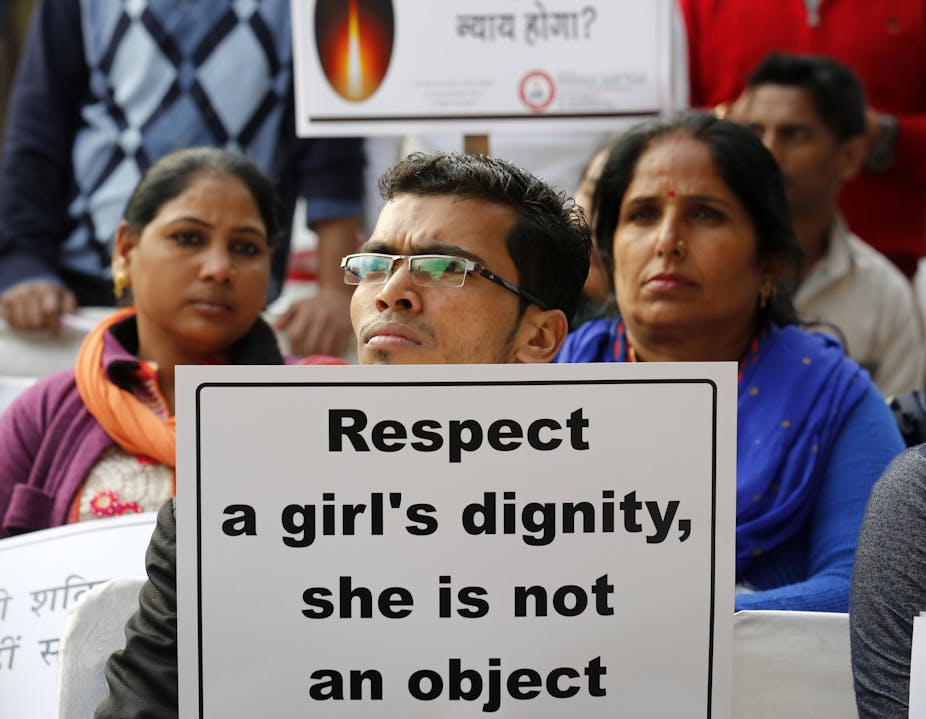After a series of high-profile rape cases, India launched a national register of sex offenders for the first time in September. Those convicted of sex crimes – including rape and sexual harassment – will now be added to a database, access to which will be given to law enforcement agencies, but not the public.
The aim of the new register is to reduce the number of crimes committed against women in India. But discouraging offences through a register is just part of the answer to improving women’s safety. Cultural attitudes toward sexual assault also need to change, as these can affect whether crimes are reported.
Evidence from other countries with similar sex offender registers is mixed, finding that they don’t seem to have an effect on re-offending rates – though they may stop sex crimes from being committed by people not already on the register. Researchers suggest that one of the reasons for this is the potential cost to offenders of being added to the register, such as difficulty finding jobs and housing.
Offenders will be added to the register only when assaults are reported and a subsequent conviction is made. Globally, the rates of reporting sexual assault to the police vary considerably, from roughly one in five in the UK, to as few as one in 50 in India. In early October, two men were arrested in India for allegedly raping a woman bathing in the Ganges, but their arrests came as a result of a video on social media – the woman did not report the alleged assault.
My colleague Tara Marshall and I conducted a recent study comparing attitudes to sexual assault in Britain and India in an attempt to understand the underlying issues affecting these reporting rates.
Cultural attitudes
In India, victims of sexual assault are often blamed for the crimes committed against them. One of the most high-profile rape cases in India happened in December 2012 when Jyoti Singh, who came to be known as “India’s Daughter”, was gang raped and murdered in Delhi. While there were movements across the country in support of Singh, much of the national conversation about the case blamed her for having been out late at night, and even for fighting back against her attackers.

Such views are a form of “rape myth acceptance” – a set of beliefs which tend to blame victims of sexual assault for having been assaulted. They include suggesting that if women wear revealing clothes or drink alcohol then they deserve what happens to them. Research suggests that one reason offences are often not reported is because of these victim-blaming beliefs. This is true across the world – but especially in India.
For our study, we asked groups of men and women from both India and Britain to look at a series of scales and rate their agreement with statements from one (strongly disagree) to seven (strongly agree). We asked them about their attitudes towards women through questions such as: “A woman should not expect to have quite the same freedom of action as a man”. We asked about their attitudes to sexism, such as: “Most women interpret innocent remarks or acts as being sexist”. And whether they agreed with rape myth acceptance, via questions such as: “Women often claim rape to protect their reputations”.
Through this, we created scores for their attitudes toward women, rape myth acceptance, and sexism. Of the 112 Indian and 117 British adults we collected data from, Indian participants’ scores were almost twice as high as those of the British participants, meaning that they were more accepting of rape myths and traditional roles.
Hostile sexism
We found a clear link between traditional attitudes toward women – such as that they should be concerned with their childbearing duties while men go to work – and higher scores on the rape myth acceptance scale, among both men and women.
Other studies in India have also shown that strong beliefs about the appropriate role for women – for example, that they should not work but rather care for the home and family – seem to increase acceptance of victim-blaming beliefs.
We also asked participants about their acceptance of other views, termed “hostile sexism” – the belief that women ought to be punished if they do not stick to traditional roles. The Indian participants in our study tended to score on average 60% higher on our measure of hostile sexism than British participants. And it was hostile sexism which we found was linked to rape myth acceptance in our scale, suggesting that those who believe women ought to be punished for stepping outside of traditional roles are also more likely to believe women are to blame for being raped.
Our findings suggest that interventions that target underlying factors such as traditional societal attitudes towards women could lead to less acceptance of rape myths and hopefully more reporting of sexual assaults.
India’s introduction of a sex offenders register is a clear step toward improving women’s safety and it should start to discourage individuals from offending and help decrease the stigma surrounding sexual assault. But a lot more needs to be done to address cultural beliefs about sexual assault to enable more women to feel able to come forward and report crimes when they occur.

